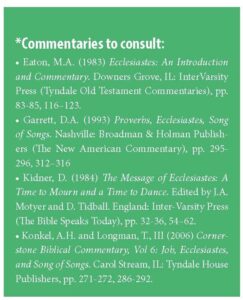
by Tim Faulkner
General Secretary
Consumption or Enjoyment? Looking for Life in Work and Money
When Ryan, Janay, and Camryn were teenagers, we started a Christmas family tradition of puzzle-making. One we worked was a 5,000-piece Ravensburger puzzle of the Sistine Chapel. Each year, we would make progress and then put it away in sections. Finally, we completed the puzzle and decided to frame it, even though it was missing a piece.
A puzzle with a missing piece is a good analogy for understanding the book of Ecclesiastes. The writer (identified in 1:1 and typically understood to be Solomon) looks at life “under the sun,” a phrase used 33 times and meaning something like life lived “apart from the revelation of God.” Thankfully, God through Solomon opens up our perspective, and we are privileged to see what God sees. The missing piece answers the question of how to enjoy wealth. In order to discover this piece, we must consider work and money “under the sun,” and work and money from God’s view.
Life under the Sun: The Vanity of Work and Money
Regarding work:
I hated all my toil in which I toil under the sun, seeing that I must leave it to the man who will come after me, and who knows whether he will be wise or a fool? Yet he will be master of all for which I toiled and used my wisdom under the sun. This also is vanity. (Ecclesiastes 2:18-19)
Regarding money:
He who loves money will not be satisfied with money, nor he who loves wealth with his income; this also is vanity. (5:10)
Work and money produce wealth. Solomon definitely knew about wealth. 1 Kings 10:25-29 (MSG) describes him: “King Solomon was wiser and richer than all the kings of the earth — he surpassed them all. People came from all over the world to be with Solomon and drink in the wisdom God had given him. And everyone who came brought gifts — artifacts of gold and silver, fashionable robes and gowns, the latest in weapons, exotic spices, and horses and mules — parades of visitors, year after year. Solomon collected chariots and horses: fourteen hundred chariots and twelve thousand horses! He stabled them in the special chariot cities as well as in Jerusalem. The king made silver as common as rocks and cedar as common as the fig trees in the lowland hills.”
We might conclude that Solomon had experienced the best that work and money had to offer, yet he remained disappointed. We know that work, in and of itself, is not the problem. In Proverbs 6:6-11, Solomon discussed the reward for hard work and the suffering of the lazy. In Genesis 2, God gave Adam work to do in the garden. The problem is not work but in trying to obtain from it something it cannot provide.
Money presents an even greater challenge. The pursuit of both work and money result in vanity, “chasing after the wind” (Ecclesiastes 2:17). A life invested in work and money eventually ends, and both must be left behind. Death is the great equaliser of those who have or do not have work and money. That leads to the next observation from an earthly perspective.
Life under the Sun: The Inability to Enjoy Wealth
In Ecclesiastes 6:1, Solomon observes that there is more rest for a stillborn baby than the man lacking nothing but incapable of enjoying what he has. This is “a man to whom God gives wealth, possessions, and honor, so that he lacks nothing of all that he desires, yet God does not give him power to enjoy them, but a stranger enjoys them. This is vanity” (6:2).
Commentators explain the expression “yet God does not give power to enjoy them” as an introduction to grace. D.A. Garrett writes, “The ability to enjoy…is itself a gift of God. Those who belong to God should above all others have a capacity to enjoy life.”* The problem, explains M.A. Eaton, is that “secular-minded men may assume the two [wealth combined with the power to enjoy it] invariably go together; the Preacher regards them as distinct.”* Why is this important? Because a true glimpse at the earthly reality leads us to the missing piece.
Life under the Sun: The Missing Piece
Solomon asks, “For apart from him who can eat or who can have enjoyment?” (2:25). He concludes that apart from God we cannot enjoy wealth; God Himself is the missing piece. We’ll look at what that means practically later, but first let’s consider the heavenly perspective. It’s about grace, but perhaps not in a way that we might have expected!
Life from God’s View: The Grace of Craving
Regarding work:
Because sometimes a person who has toiled with wisdom and knowledge and skill must leave everything to be enjoyed by someone who did not toil for it. This also is vanity and a great evil. What has a man from all the toil and striving of heart with which he toils beneath the sun? (2:21-22)
Regarding money:
He who loves money will not be satisfied with money, nor he who loves wealth with his income; this also is vanity. When goods increase, they increase who eat them, and what advantage has their owner but to see them with his eyes? Sweet is the sleep of a laborer, whether he eats little or much, but the full stomach of the rich will not let him sleep. (5:10-12)
In 6:7, Solomon adds, “All the toil of man is for his mouth, yet his appetite is not satisfied.” He also points out that both work and money lead to sleepless nights—whether you cannot stop thinking about work (see 2:23) or you have a lot of money and you are awake thinking about how to keep it (see 5:12). Is Solomon contradicting his optimism in Proverbs 6:6-11? No, but he has understood the irony of work and money, specifically that they will consume us while we seek to consume them!
Craving is grace! God placed a desire for work and money in man. D. Kidner observes that work is a joyful gift of God “if only he had had the grace to take it as such.”* Here in Ecclesiastes, God alerts us to the vanity of pursuing what work and money can never provide. Jesus underlined this in Matthew 6:24, saying you cannot serve both God and mammon (literally a rival god). If you are feeling frustrated, then Ecclesiastes is achieving its purpose, as further illustrated in the second heavenly perspective.
Life from God’s View: The Grace of Crashing
So I turned about and gave my heart up to despair over all the toil of my labors under the sun. (2:20)
There is a grievous evil that I have seen under the sun: riches were kept by their owner to his hurt, and those riches were lost in a bad venture. And he is father of a son, but he has nothing in his hand. As he came from his mother’s womb he shall go again, naked as he came, and shall take nothing for his toil that he may carry away in his hand. (5:13-15)
Commenting on 2:20, D.A. Garrett says, “He does not despair but decides to disillusion himself.”* This disillusionment or crash is what we need to prepare our heart to respond. Here is what we have discovered about the power to enjoy wealth:
- We are incapable.
- We cannot face its demands.
- We cannot take it with us.
- We cannot control what happens to it after we’re gone.
- Whatever lasts belongs to the eternal realm.
So there is power to enjoy wealth, but it is connected to the missing piece! This is the third heavenly perspective.
Life from God’s View: The Grace of Contentment
Everyone also to whom God has given wealth and possessions and power to enjoy them, and to accept his lot and rejoice in his toil—this is the gift of God. For he will not much remember the days of his life because God keeps him occupied with joy in his heart. (5:19-20)
A funny story shared on the internet illustrates our struggle to be content. “Bring the goat into the house,” said the rabbi. Now that wasn’t the response the man had expected when he went to the rabbi for advice. He and his eight friends had decided to pool their money and share the expenses of a common living arrangement. After trying it for a while, the frustrations were many, and it no longer seemed like a good idea. So the man went to the rabbi and said, “I’m miserable. Nine people in one house. What should I do?” The rabbi replied, “Do you have a goat?” “Yes,” said the man. “Then bring the goat in the house and come back in a week.” A week later the man returned, looking more distraught than before. “We can’t stand it,” he told the rabbi. “The goat is filthy. It stinks. It ate my shoes!” The rabbi said, “Go home and let the goat out and come back in a week.” A week later the man returned, radiant, exclaiming, “Life is beautiful. We enjoy every minute of it now that there’s no goat — only the nine of us.”
The need to be content demonstrates that God in His grace offers the power to enjoy wealth:
- We have to do it according to His view and not as it seems to us.
- God begins by dismantling our false hope of obtaining out of work and money what we most desire.
- God reveals Himself as the true fulfillment of our desires. Not only did God’s Son Jesus set aside all the glory of heaven and live a very simple life, He died the death of a pauper on a Roman cross so that we could obtain the glorious riches of God.
- If God did not withhold His own Son, why would He not also give us all good things?
So what does this look like practically in our lives? I encourage you to pick two of the following insights and opportunities to put into practice and discuss with someone else for accountability.
- Christ’s perfect, costly work on our behalf offers the true wealth we so crave (2 Corinthians 8:9). Receive God’s gift of eternal life (John 3:16).
- Work demands your life without offering life in return, but Jesus offers an easy yoke (Matthew 11:30). If you are feeling burdened, consider how much you are attempting to do in your own strength.
- Failure to practice “Sabbath” is like using credit to delay payment (for example, it may lead to burnout). Show confidence in God’s work by taking a Sabbath break from your efforts (Exodus 20:11).

- Work done for the Lord is not in vain (1 Corinthians 15:58).
- As we consume money, it can consume us. Jesus said that you cannot serve both God and money. Find ways to your make money serve your Master (Matthew 6:24).
- Consider what God offers when you put His Kingdom first (Matthew 6:33).
- Get-rich schemes can grow roots and make demands on us (1 Timothy 6:10). These include things like sports betting, lottery, and investments that exploit others. Stop before you lose control.
- Your wallet reveals what you desire (Matthew 6:21). Monitor purchases. Also, give away something you love (not just something that you don’t want anymore).
- Some investments pay eternal dividends — wisdom tells us to invest our riches in those (1 Timothy 6:17f).
- Ingratitude dishonors the Giver of all good things. Count your blessings! Bring the goat into the house!

